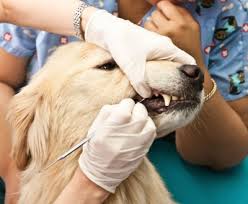The Truth About Anesthesia Free Dental
Doc Halligan, Lucy Pet Foundation
 Your local pet store may offer an Anesthesia Free Dental Cleaning. This is NOT an alternative to teeth cleaning. Doc Halligan says a real cleaning will help your pet avoid serious trouble down the line with infection of vital organs.
Your local pet store may offer an Anesthesia Free Dental Cleaning. This is NOT an alternative to teeth cleaning. Doc Halligan says a real cleaning will help your pet avoid serious trouble down the line with infection of vital organs.
The bottom line is in order for a proper deep teeth cleaning on an animal, where probes are used under the gums for scaling without hurting the teeth and then the teeth are polished, the animal must be anesthetized or put under sedation.
However, there are some animals that are an anesthetic risk. These can be animals who are elderly or who are ill. If these at risk animals can tolerate it, a mild sedative may be given.
Unfortunately, most people are being misled that Anesthesia Free Cleaning is for all animals. Anesthesia Free Cleaning is being marketed differently from what it really is. What it is, is for people who can't afford the anesthetic and their pet's teeth are horrible; or the pet is elderly. But, it doesn't replace a healthy brushing every other day or a sedated animal having their teeth cleaned properly by a professional. The people that are offering this service are making money and not being forthright to pet owners.
When an Anesthesia Free Cleaning is done, the enamel can be ruined on the teeth. Normally a veterinarian would use water, which doesn't scrape the teeth, to get rid the plaque. However, you can't use water in an Anesthesia Free Cleaning, so the enamel can get scraped off the teeth.
 Dental disease is one of the most common diseases in pets. If you're not brushing your pet's teeth every other day, by the age of three, most will have dental disease. Don't ever use human toothpaste on pets, as they can't spit it out, which can lead to tummy upset due to the fluoride. Also, don't use a human brush, as they are too hard for a pet's enamel. You can find specially flavored toothpastes made just for pets at any pet store as well as a toothbrush just for animals.
Dental disease is one of the most common diseases in pets. If you're not brushing your pet's teeth every other day, by the age of three, most will have dental disease. Don't ever use human toothpaste on pets, as they can't spit it out, which can lead to tummy upset due to the fluoride. Also, don't use a human brush, as they are too hard for a pet's enamel. You can find specially flavored toothpastes made just for pets at any pet store as well as a toothbrush just for animals.
Dental disease can cause bacteria to get into the blood stream and sit on the heart valves and/or go into to the kidneys and liver. Your pet's life can be severely shortened just by having bad teeth.
In the State of California, it is actually against the law for anyone to do a teeth cleaning, using anesthetic or not, unless it is under the guidance of a veterinary. This procedure is considered surgery, since instruments are being used.
The Mission of The Lucy Pet Foundation is to reduce pet overpopulation by having mobile spay/neuter clinics across the country and to support causes that benefit animal welfare. The Lucy Pet Foundation currently has two buses that travel around Southern California focusing on spaying and neutering. These buses are state of the art surgery units. Their next focus is in generating more funds to expand the work of these buses and have more across the country.
The Lucy Pet Foundation not only offers free and reduced spays and neuters, they also do microchipping, vaccines and de-wormings. Spaying and neutering is not only great for pet population control, but it has been proven that an animal will live on an average of 40-percent longer after having this surgery.
Visit Website
E-Cigarette Toxicity in Pets - Dr. Debbie
Think that vapor cigarettes (a.k.a. electric cigarettes or e-cigarettes) are a healthier alternative to traditional cigarettes? The vapor habit might be better for you and decrease your pet's exposure to second hand smoke, but can increase the chance of a pet's toxic ingestion of nicotine. A story from England told of the tragic death of a puppy that died after chewing on an e-liquid container.

Ivy was a 14-week on Staffordshire Bull Terrier that chewed on her owner's bottle of e-liquid used to refill the electric cigarettes. Within 30 seconds of nibbling on the container, she fell sick with vomiting and disorientation and was rushed to a veterinary office. Sadly, Ivy died within 24 hours due to heart and respiratory failure.
What's in e-liquid?
The ingredients in e-liquid vary but include carriers such as propylene glycol, polyethylene Glycol 400 and vegetable glycerin, as well as flavoring agents and nicotine. The amount of nicotine in e-liquid varies with some products not containing any nicotine, to others ranging from 18 mg/ml to 100mg/ml.
How toxic is nicotine?
The toxic dose of nicotine for pets is 0.5 to 1mg per pound of body weight. The fatal dose is 4mg per pound. So if you consider a 20 pound dog, toxicity would occur if 10mg were ingested, and the pet would die if 80mg were ingested. Therefore with the high nicotine levels in e-liquid, it wont take much to reach those fatal levels. That hypothetical 20 pound dog could die from less than 1ml of the highest potency liquid nicotine.
Pets likewise can develop toxicity if other sources of nicotine are ingested such as cigarettes, chewing tobacco, nicotine gum or nicotine nasal sprays. The typical amounts of nicotine in these products are: Cigarette 9-30 mg; Nicotine gum 2-4 mg per pieces; and Nicotine patches 8.3-114 mg.
Even cigarette butts can be toxic if enough are ingested - cigarette butts retain 25-percent of the nicotine in the original cigarette.
What are symptoms of nicotine poisoning?
Symptoms usually develop within one hour of ingestion. Pets may display excitability, rapid heart rate, drooling, vomiting, diarrhea, weakness, seizures and coma.
How are pets treated for nicotine toxicity?
The first step is to decontaminate by inducing vomiting. Nicotine typically causes vomiting when ingested, but further decontamination is advised at the veterinary office. Other emergency care includes intravenous fluids, medications to manage elevated blood pressure and heart rate and anti-seizure medications. Nicotine is metabolized by the liver and excreted within 16 hours after ingestion. Pets that survive the initial four hours after ingestion have a favorable chance of survival.
The vapor cigarette trend is becoming more popular world wide. It's important to recognize that nicotine is a toxin and poisonous to animals and children. Consider the e-liquid a hazardous material and store it safely in a locking cabinet, away from children and pets.
To read more about Ivy's toxicity after ingesting E-fluid go to "Dog dies after chewing e-fluid container."
Featured veterinarian known as "Dr. Debbie" on national pet radio program, Animal Radio. Ebook author of "Yorkshire Terriers: How to Be Your Dog's Best Friend"; "Pugs: How to Be Your Dog's Best Friend"; "Mini Schnauzers: How to Be Your Dog's Best Friend"; and "Shih Tzu: How to Be Your Dog's Best Friend." Dr. Debbie's books.
Visit Website
Animal Radio News - Lori Brooks

Autistic Dogs
Bull terriers who compulsively chase their tails may be autistic, at least that's what Dr. Nicholas Dodman, Director of the Behavior Clinic at Tufts Cummings School of Veterinary Medicine, believes. He studied the subject for years and said that like autistic people, such tail-chasing Bull terriers may be socially mal-adapted, unpredictably aggressive toward others and/or may stare into space for no apparent reason. Dodman's study was the first to propose that autism may occur in dogs.
Someone Shaved Neighborhood Cats
Residents in British Columbia were afraid to let their cats wander the neighborhood because someone kept shaving them. One woman said her 12-year-old cat came home with a square-shaped patch shaved into her belly the first time it happened and then came home with patches of hair missing four more times. It also happened to a neighbor's cat. Strangely, the cats were still let outside at nighttime because the mystery shaving incidents only happened in the daytime.
Letter Writing Celebs Asked Costco to Remove Caged Hen Eggs
Actor and activist Brad Pitt sent a personal letter to the CEO of Costco calling for the removal of egg-laying hens from crammed cages. Pitt actually wrote the letter on behalf of Farm Sanctuary, an organization aimed at rescuing and protecting abused farm animals. Talk show host Bill Maher also called for Costco to stop selling eggs from caged hens in a New York Times op-ed piece. Even actor Ryan Gosling sent the Costco CEO a letter responding to a Humane Society investigation of an egg supplier connected with the corporation.
 Movies Impact Breed Popularity
Movies Impact Breed Popularity
If you didn't see the movie Max, it starred a Belgian Malinois dog. While that might make you want to see it even more, it's not all good for the breed of dog that Hollywood makes famous. As a result, there was an increase in these dogs being handed over to shelters. Unfortunately, after seeing Max the movie, many rushed out to buy a Belgian Malinois. As past trends indicated, there was an increase in the backyard breeding of these dogs and the issues that arose because of people breeding for money without thinking about what's best for the dog. After analyzing a number of movies released between 1927 and 2004 featuring dogs and evaluating AKC registration trends, researchers confirmed that movies definitely have an impact on breed popularity. "Lassie Come Home" was associated with a 40-percent increase in Collie registrations, and after the remake of "101 Dalmatians" in 1996, animal shelters reported a 35-percent increase in the number of Dalmatians surrendered.
NFL Player Locked Himself in Hot Car to Show What Dogs Endure
Arizona Cardinal's Tyrann Mathieu's video for PETA is still heavily circulating online. If you haven't seen it, Mathieu is the NFL player who locked himself in a car to demonstrate the danger that dogs endure when they're locked inside a car on a hot summer day. After just a few minutes in the Arizona heat, Mathieu started to breathe and sweat heavily. He pointed out on the video that dogs are unable to protect themselves from the heat and can sustain brain damage, even die, after only 15 minutes. Signs of heatstroke, which can occur quickly, include restlessness, heavy panting, a darkened tongue, a rapid heart rate, fever, vomiting, glazed eyes and dizziness. People, of course, have the benefit of being able to sweat through their skin, which helps us cool down. But dogs are covered with fur and can only cool themselves by panting and sweating through their paw pads.
 Listen to the entire Podcast of this show (#1234)
Listen to the entire Podcast of this show (#1234)





